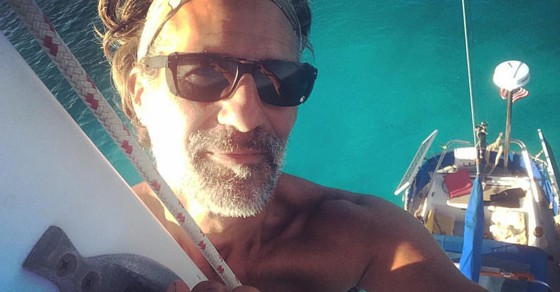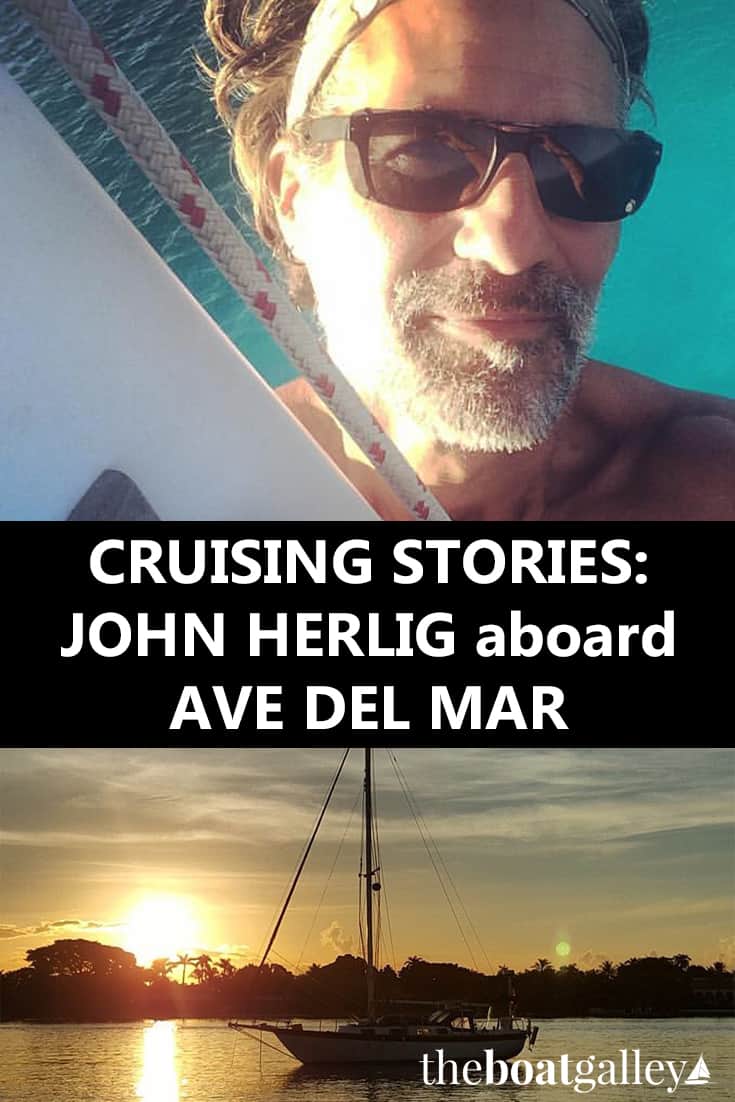Have you ever wondered “what the hell have I done” in deciding to go cruising? Wondered if it was all a monster mistake? Here’s John Herlig’s cruising story of one such day . . .
“Cruising Stories” are little glimpses of the cruising life, some written by me and others by friends and TBG readers. They’re not how-to’s or travelogues. They’re emotional and raw, hitting both the beauty of this life and the tough times. Above all, they’re real.
John Herlig | Ave del Mar — In 2013, John bought Ave del Mar, a 1967 30-foot cutter that had made two circumnavigations under her previous owner. A singlehander, John wrote this after he’d poured a year and a half into restoring Ave, shortly before he untied the dock lines in 2015. Since then, he has traveled down the east coast of the US, through the Bahamas to Haiti and then Jamaica before returning to the US to top up the cruising kitty. Since then, he’s become something of a VHF usage expert and is the author of TBG’s VHF Radio: Everything You Need to Know.
What Is It All About? was first published on John’s blog, Ave del Mar (used here with his permission). You can follow John on Instagram.
Some of life’s best lessons have been lain at my feet horribly disguised as disaster.
I had just spent a long-yet-satisfying 8 days working on Ave del Mar on land. My triumphant return to my marina in Eastport came on a Thursday, as I—equal parts pride and exhaustion—motored up from Deale, Maryland, under a glorious August sun with Ave’s hull glistening, reflecting the sparkling waters of the Chesapeake Bay. As I started to make the turn from the Severn River into my home waters of Back Creek, the engine, without warning, fell dead.
What immediately followed was nearly clinical, as I fell into a controlled rush checking engine components, fuel flow, and temperature gauges—my nautical version of a trauma surgeon fighting to save a life. Check the wind. Check the drift. Call the Coast Guard on the VHF radio. Duck below, work on the engine. Pop back up above decks, check the drift. Look for boating traffic. Talk to the Coast Guard. Back below, try Plans C, D, E, and F. Calm, cool, collected. We’ve got this. Gather information. Triage options. Evaluate conclusions. Regroup. Repeat.
Ultimately unsatisfied with the engine’s health I decided to call for a tow, roughly the equivalent of driving all the way home from your Uncle Bob’s only to have your car die just as you turn onto your street, forcing you to call AAA—but on the water we call BoatUS towing. The towboat arrived in short order, tied onto the front of Ave, and helped us limp down that painful last half mile of our journey home. A neighbor came out onto the docks to help pull the boat into her slip where I tied her off to my satisfaction. After putting a few loose items in order I sat down in the cockpit, slumped my head into my hands, and cried.
I cried hard and deep, from exhaustion that was both mental and physical. I cried from frustration. I cried from horrible feelings of helplessness. I cried because I knew I had ruined my boat’s engine, failed to prove myself as a captain, failed to pass muster as a mechanic, and was sure to slide headfirst into failing in my future attempts to find a clear path forward. I had put myself and my intentions in the public eye, and I was falling flat on my face in plain sight.
Over the next day or so, as somehow seems to happen in life, the real lessons floated up to the surface, revealing that the boat, the engine’s premature death, and my resulting emotions were all metaphors for all that happens in life, and this is exactly what makes this boating world resonate with me.
The boat is not going to sink (probably). I am not going to die as a result of sailing (probably). I will have some degree of shelter (probably), food (probably), joy (probably), and suffering (definitely) as my journey progresses. My reactions are (mostly) my own to control and choose and watch and contemplate. The stark simplicity of the boating world distills all of this down, exaggerating—or maybe simplifying?—both the causes and effects of all that crosses your path.
I watched myself as if in a movie over the next few days as I refused to crawl into the engine compartment to try to determine the state of affairs it contained. I would enter the engine’s realm when I was rested and happy, a week to the day after my little misadventure. Shockingly, things were a bit less dire than originally suspected: the engine wasn’t dead—a clogged fuel filter was to blame for starving the engine of its needed fuel. The transmission wasn’t seized—just a little whiny from lack of fluid (my fault there). Friends whose sailing experience dwarfs mine gave me good marks for the entirety of my real-time reaction—I alerted the Coast Guard of my predicament, I undertook a logical series of attempted fixes, I knew when to say “Help!” and was thereby able to avoid turning a small issue into a larger disaster. Pretty much everything I had felt had been off the mark, from my certainty that I had ruined the engine to my own feelings of doom and gloom about my abilities.
This time it was the little clogged fuel filter episode. There was also the day that I dropped a $200 turnbuckle into the river. There are all the times that I faced problems that seemed to have no solutions, parts that failed, leaks that reappeared, and issues thought solved that later declared that they were anything but. These lessons pop up over and over, cracks in the sidewalk of my life. When you see them clearly they’re almost insignificant, but should you get caught unawares they’ll send you tumbling down.
I thought that I wanted to sail so that I could experience life more fully, more intensely. Little did I know that for me, what it is all about has nothing to do with casting off those lines and catching the wind, and everything to do with my own head and the lessons of life. The experience of these things in my little petri dish of a boat has made this lesson fabulously clear, and I couldn’t be happier about that.



Claire Ford says
His reactions are much like mine. The only thing different is I’m not the captain. Whenever a problem occurs, my biggest reaction is tears. After we find out it’s not as bad (usually) as I thought, I buckle down to help anyway I can. Ahhh, the trials and tribulations of boat ownership.
David N Sheila McAndrew says
On our first trip down the ICW and can already relate! Thanks for the encouragement!
The Boat Galley says
It really does get easier. Really.
David N Sheila McAndrew says
The Boat Galley Your articles and book has certainly helped! Thank you!
Rick Garvin says
I like this series of articles. I marked this one to read later and, well, turns out John is a neighbor. Another great blog to follow. Cheers and Happy New Year!
The Boat Galley says
Thanks! I’m always on the lookout for more to include in the series — most come from FB posts, this is the only one so far that’s a blog post (obviously, all used with permission). If you happen to know of other good stories (or have one yourself), please let me know!
Barb Fonner says
Hi Carolyn. I’d love to share the story of our entry into cruising at age 73 with no prior experience. How should I proceed?
Ronald Harbin says
Hi Carolyn
I’m getting ready to head back to Vero beach where my boat is waiting to continue our trip to the Bahamas. I’ve been listening to your podcasts via Boat Radio since I started my trip from Baltimore. I’m using an app called Podcast Addict. I’m normally pretty good with computers and apps etc. but this one is becoming too much of a challenge for me. Do you have any suggestions on a good podcast app. Thanks, Ron
Carolyn Shearlock says
The app on my phone (Android) is called “Podcast Player.” It’s free and it works, but doesn’t have a lot of bells and whistles.
Anonymous says
“My reactions are (mostly) my own to control and choose and watch and contemplate. The stark simplicity of the boating world distills all of this down, exaggerating—or maybe simplifying?—both the causes and effects of all that crosses your path.”
There’s a boatload of wisdom in those two sentences.
Colin Leake says
Thanks Caroline and thank you John.
I enjoy reading the real and raw truth about boating.
John, I applaud your cool head and methodical actions during the ‘exciting’ times, executing a logical set of steps and then calling for help when needed. I am also desirous of your ability to unload the stress and anxiety of the events later at a safe time in a healthy manner 🙂
That which does not kill us makes us stronger!